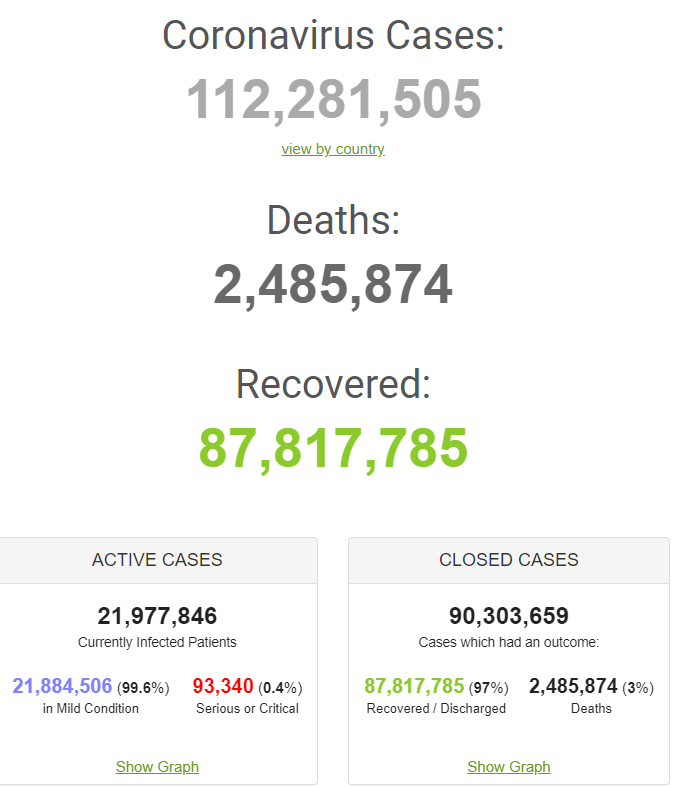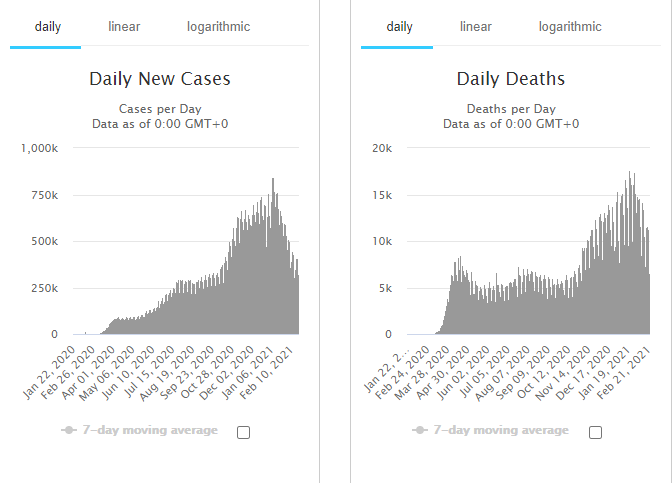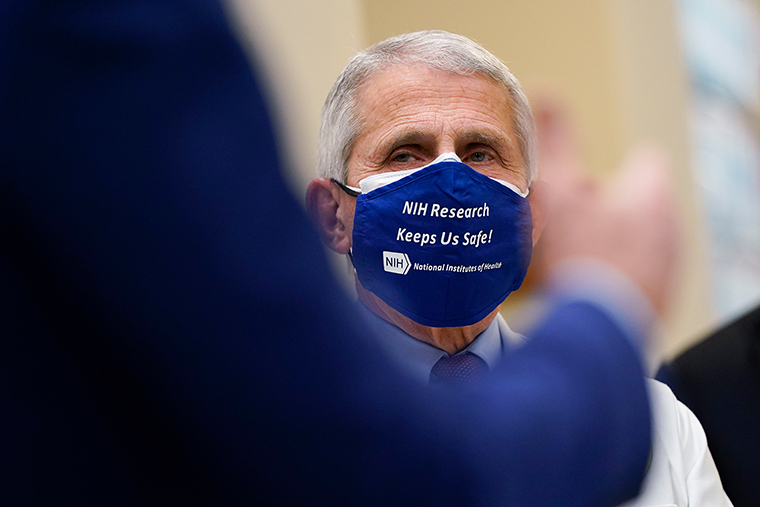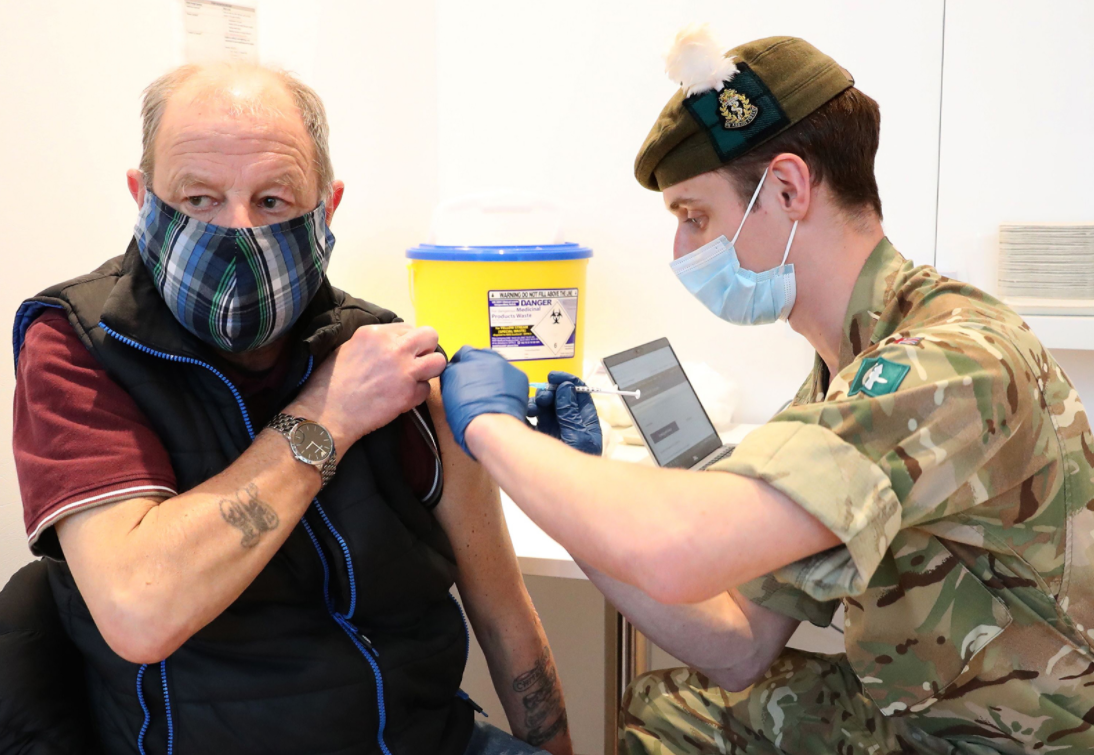
 i_need_contribute
i_need_contribute



|
Country, |
Total |
New |
Total |
|
World |
112,255,471 |
+286,189 |
2,484,953 |
|
28,826,307 |
+59,257 |
512,590 |
|
|
11,015,863 |
+10,792 |
156,498 |
|
|
10,197,531 |
+29,357 |
247,276 |
|
|
4,177,330 |
+12,604 |
83,630 |
|
|
4,126,150 |
+10,641 |
120,757 |
|
|
3,609,827 |
+4,646 |
84,613 |
|
|
3,153,971 |
+8,231 |
67,636 |
|
|
2,818,863 |
+9,630 |
95,992 |
|
|
2,646,526 |
+8,104 |
28,138 |
|
|
2,399,500 |
+4,916 |
68,772 |
|
|
2,229,663 |
+3,401 |
58,974 |
|
|
2,069,751 |
+5,417 |
51,359 |
|
|
2,041,380 |
+3,104 |
180,107 |
|
|
1,642,658 |
+3,890 |
42,188 |
|
|
1,582,275 |
+8,263 |
59,572 |
|
|
1,504,588 |
+792 |
49,150 |
|
|
1,307,662 |
+3,206 |
25,156 |
|
|
1,288,833 |
+10,180 |
34,691 |
|
|
1,286,757 |
+3,448 |
45,263 |
|
|
1,157,258 |
+4,057 |
19,453 |
|
|
1,060,801 |
+4,162 |
15,249 |
|
|
849,517 |
+3,865 |
21,723 |
|
|
803,009 |
+3,549 |
20,126 |
|
|
798,074 |
+549 |
16,023 |
|
|
781,329 |
+1,634 |
19,894 |
|
|
754,998 |
+4,955 |
5,596 |
|
|
754,473 |
+2,094 |
21,903 |
|
|
671,801 |
+3,864 |
13,295 |
|
|
572,334 |
+1,160 |
12,617 |
|
|
563,456 |
+2,288 |
12,094 |
|
|
543,717 |
+366 |
8,356 |
|
|
481,263 |
+108 |
8,559 |
|
|
446,644 |
+1,270 |
8,397 |
|
|
439,596 |
+2,956 |
4,351 |
|
|
425,597 |
+1,090 |
7,474 |
|
|
405,646 |
+2,623 |
14,347 |
|
|
375,333 |
+327 |
6,466 |
|
|
372,530 |
+2,105 |
1,140 |
|
|
368,278 |
+4,550 |
4,570 |
|
|
356,614 |
+1,541 |
4,387 |
|
|
337,087 |
+566 |
5,756 |
|
|
292,792 |
+649 |
6,577 |
|
|
285,761 |
+2,192 |
1,062 |
|
|
279,456 |
+1,144 |
1,921 |
|
|
274,968 |
+295 |
15,547 |
|
|
273,556 |
+125 |
2,061 |
|
|
268,502 |
+147 |
3,447 |
|
|
242,292 |
+521 |
11,441 |
|
|
240,017 |
+72 |
5,449 |
|
|
238,591 |
+1,925 |
9,933 |
|
|
235,882 |
+420 |
3,048 |
|
|
233,201 |
+72 |
3,202 |
|
|
228,937 |
+575 |
7,811 |
|
|
215,743 |
+686 |
4,137 |
|
|
208,117 |
+699 |
2,540 |
|
|
208,027 |
+450 |
2,343 |
|
|
202,674 |
+208 |
2,782 |
|
|
194,351 |
+281 |
3,182 |
|
|
185,014 |
+247 |
3,784 |
|
|
184,989 |
+899 |
1,049 |
|
|
180,672 |
+870 |
6,321 |
|
|
178,774 |
+623 |
10,404 |
|
|
177,407 |
+655 |
3,799 |
|
|
174,969 |
+1,334 |
1,986 |
|
|
171,289 |
+119 |
6,306 |
|
|
170,506 |
+104 |
3,167 |
|
|
165,095 |
+600 |
3,996 |
|
|
160,889 |
+463 |
257 |
|
|
153,541 |
+735 |
2,293 |
|
|
152,658 |
+940 |
3,080 |
|
|
152,616 |
+542 |
1,862 |
|
|
141,761 |
+11 |
3,197 |
|
|
139,692 |
+330 |
1,555 |
|
|
136,545 |
+477 |
1,320 |
|
|
130,212 |
+415 |
2,116 |
|
|
128,661 |
+343 |
5,016 |
|
|
118,530 |
+721 |
429 |
|
|
112,094 |
+177 |
2,964 |
|
|
104,306 |
+105 |
1,827 |
|
|
101,285 |
+1,039 |
1,681 |
|
|
99,408 |
+123 |
3,076 |
|
|
89,842 |
+11 |
4,636 |
|
|
87,324 |
+332 |
1,562 |
|
|
85,929 |
+44 |
1,458 |
|
|
81,793 |
+274 |
1,546 |
|
|
80,759 |
+506 |
582 |
|
|
33,391 |
+131 |
230 |
|
|
8,869 |
+1 |
169 |
|
|
7,692 |
+18 |
71 |
|
|
2,392 |
+9 |
35 |
Retrieved from: https://www.worldometers.info/coronavirus/
From CNN's Naomi Thomas

Dr. Anthony Fauci, director of the National Institute of Allergy and Infectious Diseases, listens as President Joe Biden speaks during a visit at the Viral Pathogenesis Laboratory at the National Institutes of Health (NIH), Thursday, Feb. 11, 2021, in Bethesda, Md. Evan VucciAP
Dr. Anthony Fauci, director of the National Institute of Allergy and Infectious Diseases, said again on Monday that Americans might be wearing masks into 2022, and although there may be far less spread of the coronavirus, people must be prepared for the possibility of another surge of cases.
On Sunday, Fauci told CNN’s Dana Bash on State of the Union that it was possible that people could be wearing masks into 2022.
“The point I was trying to make is that people ask you to make a projection when there are so many variables in there that are unpredictable,” Fauci told Gayle King on CBS This Morning on Monday.
“So, when I said we might be, I didn’t say we absolutely are going to be wearing them, I’m saying it is quite conceivable that if we actually go into the fall and the winter and there is still a degree of virus in the community, despite the fact that many people have been vaccinated – we certainly will likely, very likely be much better off then than we are now – but it is conceivable that there will be enough virus in the community that in order to be extra safe, we may have to be wearing masks under certain circumstances," he continued.
“That’s the only point that I was making, I was not trying to scare people. I’m saying we’ve got to be prepared, that variables are there and we can get another surge,” Fauci added.
While he said that he doesn’t think there will be another surge, and he hopes there won’t be, the United States has to be prepared for one.
“That’s what I meant by don’t just give up on public health measures, because we’re going in the right direction,” Fauci said.
From CNN’s Sarah Dean and Chloe Adams

A military doctor administers a Covid-19 vaccine to an Edinburgh resident on February 4. Andrew Milligan/Pool/AFP/Getty Images
Covid-19 vaccination rollout has been linked to a substantial fall in the risk of admission to hospitals from the disease in Scotland, according to early data from a study on the effect of the Pfizer and Oxford-AstraZeneca shots in the community.
Researchers compared hospital admissions among those who have had their first dose and those who have not.
By the fourth week after receiving the initial dose, the Pfizer vaccine reduced the risk of hospital admission from Covid-19 by up to 85%. The Oxford-AstraZeneca vaccine reduced the risk of hospitalization by up to 94%.
The preliminary study, which has not yet been peer reviewed, is the first to look at the two vaccines’ effect on preventing severe illness resulting in hospitalization across an entire country, with previous efficacy results coming from clinical trials.
The EAVE II project, carried out by researchers from the Universities of Edinburgh, Strathclyde, Aberdeen, Glasgow and St Andrew’s and Public Health Scotland (PHS), analyzed a dataset covering almost the entire Scottish population of 5.4 million.
Researchers analyzed data for every week between December 8 and February 15. During this period 1.14 million vaccines were administered (some 650,000 people got the Pfizer shot and some 490,000 had Oxford-AstraZeneca) with 21% of the Scottish population receiving a first dose, according to a University of Edinburgh press release.
Among those aged 80 years and over -- one of the highest risk groups -- vaccination was associated with an 81% reduction in hospitalization risk from Covid-19 in the fourth week, when the results for both vaccines were combined, according to the press release.
“These results are very encouraging and have given us great reasons to be optimistic for the future. We now have national evidence -- across an entire country -- that vaccination provides protection against Covid-19 hospitalizations,” lead researcher Aziz Sheikh, director of the University of Edinburgh’s Usher Institute, said in the release.
Roll-out of the first vaccine dose now needs to be accelerated globally to help overcome this terrible disease.”
The researchers say the findings are applicable to other countries that are using the Pfizer and Oxford-AstraZeneca vaccines but caution that the data does not allow for comparisons between the two vaccines. “We haven't done a direct comparison between the two,” Sheikh said during a Monday news press conference.
Dr. Jim McMenamin, national Covid-19 incident director for PHS, stressed that the results are from a single dose, rather than a complete course of the vaccine. He said the bottom line is the team are “very encouraged” by the national data that shows the Pfizer and Oxford-AstraZeneca vaccines “are providing substantial protection against the risk of hospital admissions.
“No matter which of the two vaccines that any of our population are receiving, on the basis of the information that we're presenting ... there's encouragement, about the effect of both vaccines,” he added.
From CNN's Theresa Waldrop
From Washington state to Florida, from California to Massachusetts, facilities are opening to help the growing number of Americans who suffer from Covid-19 symptoms many months after their diagnosis.
Just a little more than a year into the pandemic, it's not clear how many Covid-19 patients go on to develop what's called long-term Covid, or long Covid. A recent study that included mostly people who had just mild cases found 30% were reporting symptoms as long as nine months after contracting the virus. Other studies have found a higher percentage.
And almost every day that doctors work with these Covid long haulers brings new revelations about the syndrome, which manifests itself in a vast array of symptoms in patients of all ages and of every health status pre-Covid.
"We now realize it goes way beyond the standard post viral syndrome," said Dr. William Li, a physician of internal medicine and founder of the Angiogenesis Foundation, a nonprofit that focuses on the role of blood vessels in diseases.
"These symptoms can last for nine months. And we're going on to a year now, we're still seeing new symptoms unfold," said Li, a vascular biologist who has been researching Covid for almost a year.
Retrieved from: https://edition.cnn.com/world/live-news/coronavirus-pandemic-vaccine-updates-02-23-21/index.html

President John Magufuli of Tanzania in 2016. Having cast doubt on coronavirus vaccines and other measures to curb the spread of the pandemic, he is now changing course.Credit...Thomas Mukoya/Reuters
Officially, Tanzania has not reported a single coronavirus case since April 2020. According to government data, the country has had only 509 positive cases and 21 deaths since the start of the pandemic.
Almost no one believes those numbers to be credible. But they fit with President John Magufuli’s declaration that the pandemic was “finished.”
Now, facing criticism from the World Health Organization and skepticism from the public as Tanzanians take to social media to voice concern about a growing number of “pneumonia” cases, Mr. Magufuli is changing course and asking people to take precautions against the coronavirus and wear masks.
Speaking during a church service in the port city of Dar es Salaam, the president asked congregants to continue praying for the disease to go away but also urged them to follow “advice from health experts.”
In a statement released by his office, Mr. Magufuli said his government had never barred people from wearing masks but urged them to use only those made in Tanzania.
“The masks imported from outside the country are suspected of being unsafe,” the statement said.
Mr. Magufuli’s comments come a day after the director general of the World Health Organization urged the country to start reporting coronavirus cases and share data.
Mr. Magufuli, 61, who was re-elected last October, has derided social distancing, publicized unproven treatments as a cure for the virus, questioned the efficacy of coronavirus testing kits supplied by the Africa Centers for Disease Control and Prevention and said that “vaccines don’t work.”
Yet health experts, religious entities and foreign embassies have issued warnings about the rising number of cases — and as deaths follow, the reality is harder to dismiss.
The vice president of the semiautonomous island of Zanzibar, Seif Sharif Hamad, died last week after contracting the virus, according to his political party. The United States Embassy in Tanzania also said in a statement it was “aware of a significant increase in the number of Covid-19 cases” since January.
Lawmakers are increasingly asking the health authorities to explain why so many people are dying from respiratory problems.
Speaking on Friday at the funeral of a government official, however, Mr. Magufuli said that citizens should put God first and not be instilled with fear about the virus.
“It is possible that we wronged God somewhere,” he said. “So let’s stand with God, my fellow Tanzanians.”
In his statement, the W.H.O. chief, Dr. Tedros Adhanom Ghebreyesus, said he had spoken to “several authorities” in the country about their plans to mitigate the spread of the coronavirus but had yet to receive any response.
“This situation remains very concerning,” he said.

Originally from Lebanon, Tarek Wazzan is against any vaccines. He is the owner of Lebanese Eatery, a restaurant in Port Richmond. Before the pandemic, Wazzan refused to vaccinate his children and subsequently was not able to send them to school so they are home-schooled.Credit...Kirsten Luce for The New York Times
Around the United States, the vaccine rollout has reflected the same troubling inequalities as the pandemic’s death toll, leaving Black, Latino and poorer people at a disadvantage. In New York City, home to more than three million immigrants from all over the world, data released last week suggests that vaccination rates in immigrant enclaves scattered across the five boroughs are among the city’s lowest.
This month, The New York Times interviewed 115 people living in predominantly immigrant neighborhoods about the rollout and their attitudes toward the vaccines.
Only eight people said they had received a shot. The interviews revealed language and technology roadblocks: Some believed there were no vaccine sites nearby. Others described mistrust in government officials and the health care system. Many expressed fears about vaccine safety fomented by news reports and social media.
The broader public may find it difficult to understand why people in communities ravaged by the coronavirus would be reluctant to line up to get vaccinated, said Marcella J. Tillett, the vice president of programs and partnerships at the Brooklyn Community Foundation.
“This is where there has been a lot of illness and death,” said Ms. Tillett, whose foundation is distributing funds to social service organizations for vaccine education and outreach. “The idea that people are just going to step out and trust a system that has harmed them is nonsensical.”
To be sure, thousands of immigrant New Yorkers have gotten vaccinated, navigating the system with patience, if not ease. Others have relied on social service organizations. BronxWorks recently held a five-day vaccine pop-up on the Grand Concourse in the Bronx, administering hundreds of shots each day.
To increase participation in immigrant enclaves and communities of color, the city has opened vaccine mega-sites at Yankee Stadium in the Bronx and Citi Field in Queens, which offer vaccinations to eligible residents of each borough. (There have been reports of suburbanites coming in to claim doses.)
The state is holding online “fireside chats” in several languages, opening new sites in Brooklyn and Queens, and continuing to bring pop-up sites to neighborhood organizations.
On Monday, Gov. Andrew M. Cuomo said that the Metropolitan Transportation Authority would boost bus service to the two new vaccine sites from public housing projects and community centers in Brooklyn and Queens to better serve Black, Latino and poorer New Yorkers who are most vulnerable to the virus.
Still, obstacles remain.
Retrieved from: https://www.nytimes.com/live/2021/02/22/world/covid-19-coronavirus/vaccination-rates-in-immigrant-enclaves-are-among-new-york-citys-lowest
Italy allegedly misled the World Health Organization (WHO) on its readiness to face a pandemic less than three weeks before the country’s first locally transmitted coronavirus case was confirmed.
Each year, countries bound by the International Health Regulations (IHR) – an international treaty to combat the global spread of disease – are required to file a self-assessment report to the WHO on the status of their preparedness for a health emergency.
Italy undertook its last self-assessment report on 4 February 2020. In section C8 of the report, seen by the Guardian, where countries have to evaluate their overall readiness to respond to a public health emergency, the author marks Italy in ‘level 5’, which is the highest status of preparedness.
The category states that a country’s “health sector emergency response coordination mechanism and incident management system linked with a national emergency operation centre have been tested and updated regularly”.
However, it emerged last year that Italy had not updated its national pandemic plan since 2006, a factor that may have contributed to at least 10,000 Covid-19 deaths during the first wave and which is a key element in an investigation into alleged errors by authorities being carried out by prosecutors in Bergamo, the Lombardy province that was severely affected in the pandemic’s early stage.
The self-assessment document has been given to the Bergamo prosecutors as additional evidence towards a civil lawsuit filed by the families of Covid-19 victims in December against leading politicians for alleged criminal negligence over their handling of the pandemic.
Italy’s first local coronavirus transmission was confirmed on 21 February in the Lombardy town of Codogno, and two days later an outbreak occurred in the hospital of the Bergamo town of Alzano Lombardo. But unlike Codogno, which was immediately quarantined along with nine other towns in Lombardy and one in Veneto, the Alzano Lombardo hospital was reopened a few hours after the outbreak while Bergamo province only went into lockdown with the entire Lombardy region two weeks later.
Bergamo prosecutors last year questioned Giuseppe Conte, who until earlier this month was prime minister; Roberto Speranza, the health minister; Luciana Lamorgese, the interior minister; and Attilio Fontana, president of the Lombardy region, as part of their investigations. They also questioned Giuseppe Ruocco, current general secretary for the health ministry and a general director of preventive health from 2012-2014, in January.
Conte, who was questioned by prosecutors last June, told the Guardian in an interview in October that, if summoned, he would be willing to be questioned again, but that he did everything he possibly could do manage a really difficult situation. Speranza, who was questioned last June and again in January, has not commented publicly on the investigation, neither have Lamorgese, Fontana or Ruocco.
Ruocco reportedly contradicted Italy’s self-assessment report of February 2020 by confirming to prosecutors that the pandemic plan was last drafted in 2006, despite the country being obliged to update the plan according to WHO guidelines in 2013 and 2018.
In an analysis of the self-assessment document compiled by Pier Paolo Lunelli, a retired army general, 60 out of 70 answers provided by Italy were judged to be “groundless”. Lunelli wrote in his analysis, which has been given to prosecutors, that the document “constitutes a castle of evidence which certifies the [level of] unpreparedness we approached the coronavirus emergency with”.
“We lied to the Italian citizens claiming we were ready,” added Lunelli. “Worse, we tried to deceive even the WHO, the EU and the ‘provident’ European countries, declaring to have capabilities which, in the light of the facts, we did not have.”
Italy, which was the first European country to be hit by the pandemic, had registered 95,992 coronavirus-related deaths as of Monday – the highest toll in Europe after the UK.
Consuelo Locati, the lawyer representing the families behind the civil lawsuit, said the self-assessment report could represent “resounding evidence of all the premises for false representation”.
Locati is preparing to write to Italy’s new prime minister, Mario Draghi, to ask for a compensation law for the relatives of coronavirus victims.
Locati claimed that not only was Italy’s pandemic plan severely outdated, but that it had never been tested to establish if it worked.
Retrieved from: https://www.theguardian.com/world/2021/feb/22/italy-misled-who-on-pandemic-readiness-weeks-before-covid-outbreak
Here are the key developments from the last few hours:
· More than half a million people have died of Covid-19 in the US, according to Johns Hopkins University. The country had recorded more than 28 million cases and 500,071 lives have been lost as of Monday afternoon. In a somber address to the nation as the US surpassed half a million coronavirus deaths on Monday, Joe Biden urged the country to unify in its battle against the virus.
· Dr Fauci: the political divide added to ‘stunning’ US deaths. Dr Anthony Fauci, the nation’s top infectious disease expert, said political divisiveness contributed significantly to the “stunning” US coronavirus death toll, which on Monday surpassed 500,000 lives lost.
· Italy allegedly misled the World Health Organization on its readiness to face a pandemic less than three weeks before the country’s first locally transmitted coronavirus case was confirmed.
· Syria has authorised the use of Russia’s Sputnik V coronavirus vaccine, its embassy in Moscow said Monday. The country is the latest to approve the Russian vaccine, named after the Soviet-era satellite. Sputnik V was registered in August before clinical trials were underway, which left experts wary.
· UK govt eyeing return to normal by end of June. British Prime minister Boris Johnson on Monday set out a four-step plan to ease coronavirus restrictions, expressing hope that life could get back to normal by the end of June.
· Austria is betting on millions of tests to contain Covid-19. While Austria has struggled to contain the second wave of the coronavirus pandemic, it is fast emerging as a world leader in testing as a way to reopen schools and businesses.
· The World Health Organization has agreed a no-fault compensation plan for claims of serious side effects in people in 92 poorer countries due to get Covid vaccines via the Covax sharing scheme, resolving a big concern among recipient governments.
· Guinea will launch an Ebola vaccination drive Tuesday after a flight delayed by a Saharan dust storm arrived carrying thousands of jabs, as the West African country fights to stamp out a resurgence of the deadly virus.
· New Zealand has confirmed three new coronavirus cases – a schoolmate of a person from the original Auckland cluster and their two siblings. One of the siblings had been working at a K-Mart and 31 staff have now been identified as close contacts.